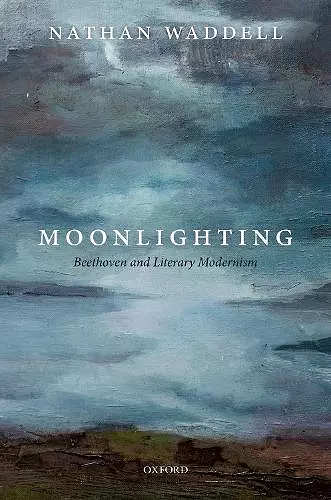Moonlighting
Beethoven and Literary Modernism
Format:Hardback
Publisher:Oxford University Press
Published:2nd Jul '19
Currently unavailable, and unfortunately no date known when it will be back

How and why did the life and music of Ludwig van Beethoven (1770-1827) matter to experimental writers in the early twentieth century? Previous answers to this question have tended to focus on structural analogies between musical works and literary texts, charting the many different ways in which poetry and prose resemble Beethoven's compositions. This book takes a different approach. It focuses on how early twentieth-century writers--chief among them E. M. Forster, Aldous Huxley, Wyndham Lewis, Dorothy Richardson, Rebecca West, and Virginia Woolf--profited from the representational conventions associated in the nineteenth century and beyond with Beethovenian culture. The emphasis of Moonlighting falls for the most part on how modernist writers made use of Beethovenian legend. It is concerned neither with formal similarities between Beethoven's music and modernist writing nor with the music of Beethoven per se, but with certain ways of understanding Beethoven's music which had long before 1900 taken shape as habit, myth, cliché, and fantasy, and with the influence they had on experimental writing up to 1930. Moonlighting suggests that the modernists drew knowingly and creatively on the conventional. It proposes that many of the most experimental works of modernist literature were shaped by a knowing reliance on Beethovenian consensus; in short, that the literary modernists knew Beethovenian legend when they saw it, and that they were eager to use it.
Moonlighting is particularly enlightening in its commentary on representations of women performing Beethoven. * Scott McCracken, Pilgrimages: A Journal of Dorothy Richardson Studies (PUBLICATION) *
Moonlighting would be an excellent book for an interdisciplinary graduate seminar on music and literature. ... For music students and scholars, one challenge presented by Moonlighting might be the sheer volume of literary references and the close reading of literary texts. Ultimately, the book is highly recommended as a work of paramusicology, offering a fascinating exploration of the liminal space between Beethoven and Beethovenism via its accessible prose, authoritative analyses, and nearly seamless integration of literary and musicological sources. * Alexander Carpenter, Music Library Association *
Moonlighting is a revealing lesson in understanding how and why modernist authors engaged with these Beethovenian tropes...Novels, [Waddell] points out, are not just stories or representations of ideas; they are a space in which to study music and the concrete ways in which we engage with it. Waddell's framing of novelists as musicologists at the beginning of Moonlighting is therefore apt. By the end of the book, Waddell has demonstrated convincingly how authors like West, Lewis and Richardson explored responses to Beethoven - not through research, but through imaginative novels that combined musical sensitivity with literary insight. * Colin Ziegler, Eighteenth-Century Music *
Moonlighting is exemplary in demonstrating the value of attending closely to those passing references to musical culture that are often overlooked in accounts of literary modernism. * Fraser Riddell, Modernism / Modernity *
Moonlighting delivers an invaluable appraisal of the Beethovenian in modernist literature, and its contributions to musico-literary scholarship will continue to emerge with the benefit of time and further exploration. * Jon Churchill, The Modernist Review *
What is certain is that Waddell has produced a brilliant account of the ways in which Beethoven's work was perceived, consumed and transformed by the writers of the modernist era. It is a work of tremendous erudition, full of thought-provoking ideas, conveyed with zest, discrimination and enthusiasm. Scholars of literature and music will discover something new on every page, and the general reader will marvel at the breadth and scope of this excellent book. * Rob Spence, formerly Associate Head of the Department of English and History at Edge Hill University, Shiny New Books *
a brilliant account of the ways in which Beethoven's work was perceived, consumed and transformed by the writers of the modernist era. It is a work of tremendous erudition, full of thought-provoking ideas, conveyed with zest, discrimination and enthusiasm. Scholars of literature and music will discover something new on every page, and the general reader will marvel at the breadth and scope of this excellent book. * Rob Spence, Shiny New Books *
ISBN: 9780198816706
Dimensions: 240mm x 161mm x 22mm
Weight: 578g
272 pages